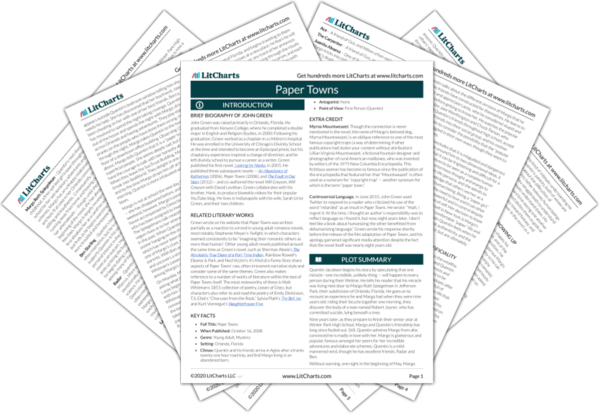Quentin’s obsession with Margo shapes his experience of finishing high school, and of the milestones associated with that transition. He misses both prom and graduation so that he can pursue Margo, and when he is forced to attend an after-prom party so he can drive Ben home, he is sullen and cynical, refusing to enjoy himself on principal. He becomes disinterested in the romantic and sexual lives of his friends, each of whom becomes seriously involved with a girl during the last weeks of school. When asked to think or talk about the landmark experiences that mean so much to Ben and Radar, Quentin often makes cynical comments about the triteness and inauthenticity of those experiences, similar to the ones Margo makes at the beginning of the novel. Quentin’s refusal to participate in the rituals that come with finishing high school and transitioning to adulthood is partly a result of the unhappiness and isolation Quentin has felt during his adolescence, but it also illustrates how difficult it is for him to confront the necessity of growing up and leaving home. His handling of the situation contrasts with those of his friends, who continue to invest in the people and experiences around them even as the moment of separation approaches: Radar falls in love with Angela despite knowing that they will need to part ways in the fall, and Ben demonstrates a willingness to revise his opinions of others by pursuing a relationship with Lacey and relishes new friendships with his classmates.
On his last day of high school, Quentin reflects on the pleasures of leaving a place where one has put down roots. Throwing away the contents of his locker and walking away from the school building are exhilarating experiences for him, and he is surprised to discover how easy it is to leave that period of his life behind. He also recognizes that leaving may only feel liberating when there is something significant to leave behind, and wonders whether the best thing to do would be to chase that feeling indefinitely, leaving one place after another for his whole life. He confronts that possibility more clearly after he is reunited with Margo. During their day together in Agloe, both must make choices about the kind of lives they want to lead as adults. Margo swears off conventional paths to success, which start with college and end with a career and family, and decides instead to strike out on her own and try to build a life in New York City. Quentin, however, insists that things like education and family can produce to happiness and lead to a meaningful life. He declines Margo’s offer to start a new life in New York with her, but he remarks before they part ways that “not following her is the hardest thing I’ve ever done.” Though Quentin does not condemn Margo for her choice, his decision to reject her restless way of life raises questions about the nature of adulthood, and whether it is possible to build a satisfying life if one is afraid of putting down roots.
Leaving Home and Growing Up ThemeTracker

Leaving Home and Growing Up Quotes in Paper Towns
“Did you know that for pretty much the entire history of the human species, the average life span was less than thirty years? You could count on ten years or so of real adulthood, right? There was no planning for retirement. No planning for a career. There was no planning … And now life has become the future. Every moment of your life is lived for the future.”
“Let me give you some advice: let her come home. I mean, at some point, you gotta stop looking up at the sky, or one of these days you’ll look back down and see that you floated away, too.”
“I know it’s impossible for you to see peers this way, but when you’re older, you’ll start to see them — the bad kids and the good kids and all kids — as people. They’re just people, who deserve to be cared for. Varying degrees of sick, varying degrees of neurotic, varying degrees of self-actualized.”
I couldn’t help but think about school and everything else ending. I liked standing just outside the couches and watching them — it was a kind of sad I didn’t mind, and so I just listened, letting all the happiness and the sadness of this ending swirl around in me, each sharpening the other. For the longest time, it felt kind of like my chest was cracking open, but not precisely in an unpleasant way.
“I know you want to find her. I know she is t he most important thing to you. And that’s cool. But we graduate in, like, a week. I’m not asking you to abandon the search. I’m asking you to come to a party with your two best friends who you have known for half your life.”
It is so hard to leave — until you leave. And then it is the easiest goddamned thing in the world.
I blame her for this ridiculous, fatal chase — for putting us at risk, for making me into the kind of jackass who would stay up all night and drive too fast. I would not be dying were it not for her. I would have stayed home, and I have always stayed home, and I would have been safe, and I would have done the one thing I have always wanted to do, which is grow up.











